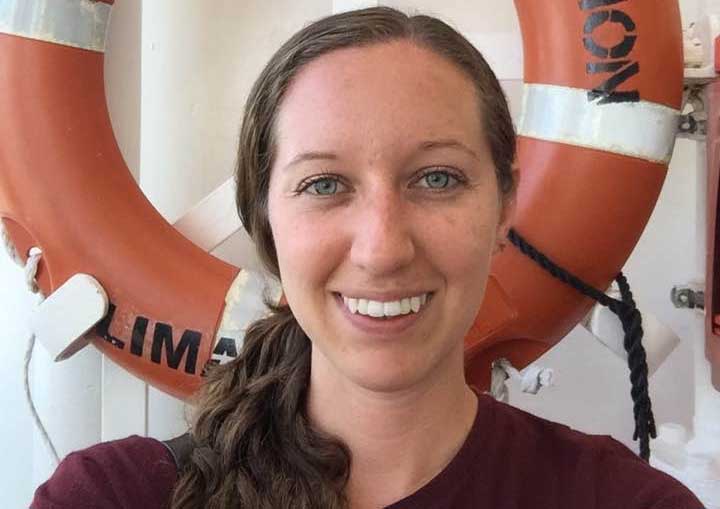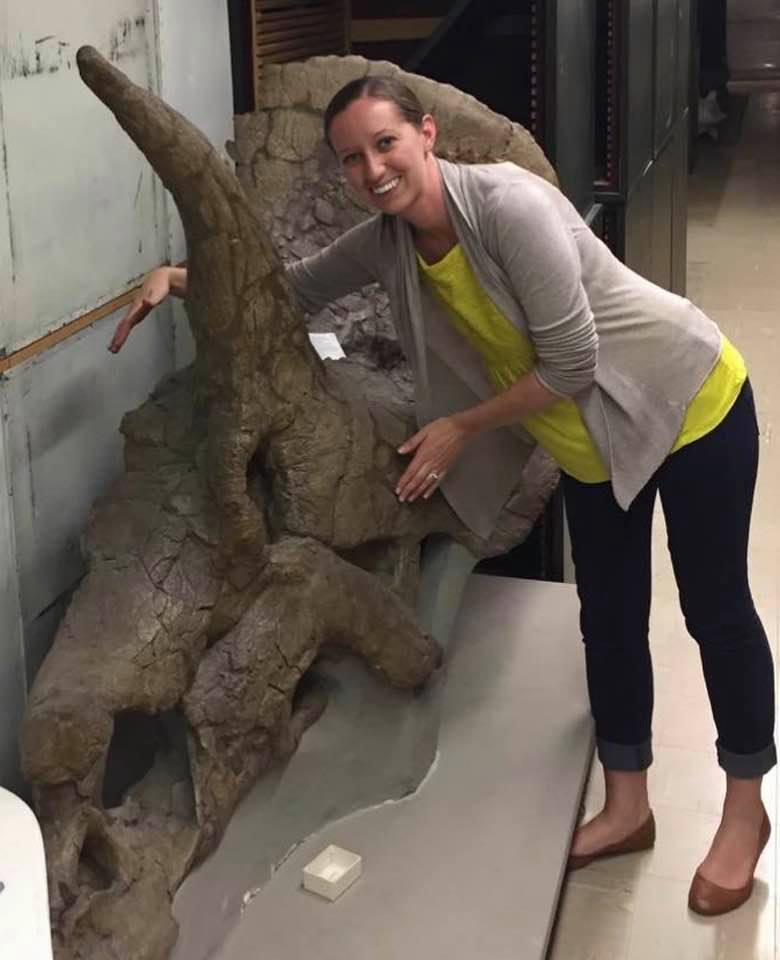Research currents: Paleontologist receives Presidential Diversity Postdoctoral Fellowship

Millions of years ago, plankton swarmed in the warming currents of an ancient ocean. Their fossilized bodies — too small to see in detail with the naked eye — may hold clues to the future as the climate warms once again, this time driven by human industry.
That’s the current research focus of Adriane Lam, a Presidential Diversity Postdoctoral Fellow who joined Binghamton University’s Department of Geological Sciences and Environmental Studies in January.
The Virginia native, who recently received her doctorate from the University of Massachusetts Amherst, is the first paleontologist to work on Binghamton’s campus in more than 20 years. Her experience includes both macrofossils — those large enough to hold in your hand — and microfossils, which can only be seen in detail under a microscope. This range will allow her to teach courses that appeal to a wide spectrum of students, who she will encourage to work on paleontology projects that spark their curiosity, she said.
For a field with a focus on the past, it’s surprisingly pertinent to today’s world. Paleontologists can identify so-called diversity hotspots, places where many species originate, for example.
“Paleontologists are incredibly important, especially now. We understand the drivers of speciation, how extinctions affect populations on different time scales and how extinct species affect the food chain,” she explained.
The importance of diversity
Diversity is important to any ecosystem — including the University. The postdoctoral fellowship, which can lead to a tenure-track position, allows Binghamton to recruit highly qualified candidates for research and scholarship in disciplines that have found it difficult to attract a diverse faculty.
“I see it as a huge responsibility and opportunity, both to our faculty, students and to myself,” Lam said.
As a whole, geological sciences remains largely male-dominated, with women comprising only a fifth to a quarter of the workforce, and approximately a quarter of associate professor-level faculty positions, according to published research. In regard to race, the picture is almost uniformly white, with about 85% of doctorates in the field granted to non-Hispanic whites over the past 40 years. And those statistics don’t take into account the less visible forms of diversity, such as disability, low socioeconomic status and first-generation college students, Lam pointed out.
She’s a first-generation college student herself, and understands how difficult it can be to navigate a large university. The daughter of a machinist and a nurse, she began her journey through higher education at a community college and became the first in her family to pursue a graduate degree.
At times, her family was also food- and housing-insecure, forcing her to juggle 20- to 30-hour weeks in retail with her community college classes so she could help pay bills and save for her future education.
“Those times were very hard, but for some reason or another I just kept going. I knew I never wanted to be financially unstable again and I really wanted to travel the world,” she reflected. “I’m very fortunate I had mentors and advisors along my academic journey who kept me motivated and opened doors for me, otherwise I would not be where I am today.”
True to the first-generation college experience for many students, that journey had its isolating moments. As a doctoral student, she faced criticism for her pronunciation of certain words, she remembered.
“I’ve always been cognizant of my Southern accent, and how such accents can signal ‘lower class’ or ‘redneck’ to some people,” she said.
Lam felt alone at UMass, until she talked to her professors and fellow students — and found that she wasn’t the only first-generation academic among them. It’s an experience that shows the true value of diversity: showing students that they do indeed belong and are welcome in higher education. Diverse faculty also bring different life experiences and perspectives, fostering creativity and different ways to tackle scientific problems, she said.
She moved to Binghamton with her husband five months before her start date, and felt welcomed from the very start. “The entire faculty has been incredibly supportive and have made my transition as smooth as possible,” Lam said. “So, even though we are currently in the midst of a pandemic, I’ve actually had a great time here thus far!”
Research
The fellowship gives Lam a unique opportunity to focus solely on her own research rather than teaching, although that will change this fall when she returns to the classroom to teach a course on mass extinctions. She’s thrilled by both prospects, and has picked up books and fun dinosaur-themed jewelry in preparation for the class.
Lam has several research areas, but closest to her heart is paleobiogeography — in other words, the study of the geographic distribution of ancient life, and how and why that distribution changed through time. Her master’s work focused on how invertebrates from 450 million years ago moved around the globe, while her doctoral work dealt with fossil plankton over the last 15 million years.
“By investigating the response of species across past warming events, we can say something about the response of species to current and future warming trends,” she said.
Other areas of interest include paleoceanography, which infers the behavior of the ocean in the deep past, and planktic foraminiferal biostratigraphy, which uses fossil plankton extracted from deep-sea sediment cores to determine the age of rocks and sediment. That latter area of study has sent her sailing around the world through the International Ocean Discovery Program. Each expedition at sea lasts two months, and she’s next scheduled to go in the spring of 2021.
Back on shore, Lam is also deeply involved with educational outreach. She co-created TimeScavengers.org to teach the public about climate change and evolutionary theory. With her colleague on the project, Jennifer Bauer, she is also investigating the best ways to communicate about science on the web and particularly on social media. They are also working this year on creating a grant that will allow students and scientists to attend conferences.
“We are really fortunate to have Adriane in our Department and at Binghamton University. She is an excellent research scientist who has an infectious positive attitude and excitement about the geological sciences and science communication,” said Assistant Professor of Geological Sciences and Environmental Studies Molly Patterson. “After only being here for a semester, she has already made a big impact on my research group, and will serve as an ideal representative of our department and Binghamton University on large international science platforms such as the International Ocean Discovery Program.”


